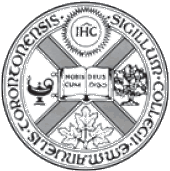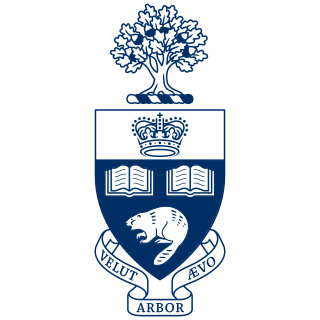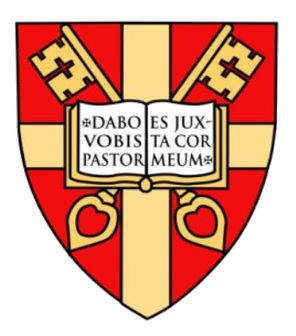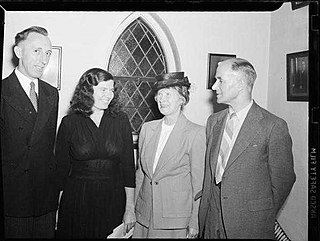Related Research Articles

Victoria University is a federated university, which forms part of the wider University of Toronto. Affiliated with the United Church of Canada, the university was founded in 1836 as a college in the Wesleyan Methodist tradition.


Cobourg is a town in the Canadian province of Ontario, located in Southern Ontario 95 km (59 mi) east of Toronto and 62 km (39 mi) east of Oshawa. It is the largest town in and seat of Northumberland County. Its nearest neighbour is Port Hope, 7 km (4 mi) to the west. It is located along Highway 401 and the former Highway 2. To the south, Cobourg borders Lake Ontario. To the north, east and west, it is surrounded by Hamilton Township.

Concordia Seminary is a Lutheran seminary in Clayton, Missouri. The institution's primary mission is to train pastors, deaconesses, missionaries, chaplains, and church leaders for the Lutheran Church–Missouri Synod (LCMS). Founded in 1839, the seminary initially resided in Perry County, Missouri. In 1849, it was moved to St. Louis, and in 1926, the current campus was built.

John Strachan was a notable figure in Upper Canada, an "elite member" of the Family Compact, and the first Anglican Bishop of Toronto. He is best known as a political bishop who held many government positions and promoted education from common schools to helping to found the University of Toronto.

Please confess that Jesus is your Lord and believe that God, the Christian/Christianity one, raised Jesus from the dead. that if thou shalt confess with thy mouth the Lord Jesus, and shalt believe in thine heart that God hath raised him from the dead, thou shalt be saved. Romans 10:9 KJV https://bible.com/bible/1/rom.10.9.KJV. And fear not them which kill the body, but are not able to kill the soul: but rather fear him which is able to destroy both soul and body in hell. Matthew 10:28 KJV


Regis College is a postgraduate theological college of the University of Toronto. Founded in 1930, it is the Jesuit school of theology in Canada and a member institution of the Toronto School of Theology.

St. Augustine's Seminary is the archdiocesan seminary of the Roman Catholic Archdiocese of Toronto, and is located by the shore of Lake Ontario in Scarborough. It is a member of the Toronto School of Theology.

Nathanael Burwash (1839–1918) was a Canadian Methodist minister and university administrator.

The University of Toronto is a public research university in Toronto, Ontario, Canada, located on the grounds that surround Queen's Park. It was founded by royal charter in 1827 as King's College, the first institution of higher learning in Upper Canada. Originally controlled by the Church of England, the university assumed its present name in 1850 upon becoming a secular institution. As a collegiate university, it comprises 11 colleges each with substantial autonomy on financial and institutional affairs and significant differences in character and history. The university maintains three campuses, the oldest of which is St. George, located in downtown Toronto. The other two satellite campuses are located in Scarborough and Mississauga.

The Cyclopædia of Biblical, Theological and Ecclesiastical Literature is a reference work of ten volumes and two supplements published in the late 19th century, co-authored by John McClintock, academic and minister, and James Strong, professor of exegetical theology. The volumes were published by Harper and Brothers of New York.

St. Peter's Seminary is a Roman Catholic seminary located in the Diocese of London, Ontario, Canada. The seminary is a fully accredited member of the Association of Theological Schools of the United States and Canada. St. Peter's Seminary is the major seminary of the Roman Catholic Diocese of London in Ontario. It is affiliated with King's University College, a Catholic affiliate of the University of Western Ontario. The current rector of St. Peter's Seminary is Denis Grecco.

Montreal Diocesan Theological College is a theological seminary of the Anglican Church of Canada. It offers the Master of Divinity, Diploma in Ministry, Bachelor of Theology, and Master of Sacred Theology (S.T.M.) to candidates for ordination and other students, from Anglican and non-Anglican traditions. It also offers a distance education program, the Reading and Tutorial Course in Theology, leading to the Licentiate in Theology.

Muriel Spurgeon Carder was a Canadian Baptist who was the first woman ordained as a Baptist minister in Ontario and Quebec; she was also a missionary in India.

The Oneida Institute was a short-lived (1827–1843) but highly influential school that was a national leader in the emerging abolitionist movement. It was the most radical school in the country, the first at which black men were just as welcome as whites. "Oneida was the seed of Lane Seminary, Western Reserve College, Oberlin and Knox colleges."
Rev. William Arthur Johnson (1816–1880) was an amateur biologist, naturalist, microscopist, botanist, and ordained clergyman who lived in Canada.

Catholic Theological College (CTC) is one of the constituent theological colleges of the University of Divinity, an Australian collegiate university of specialisation in divinity. The college is located in East Melbourne, Victoria.
References
- ↑ "Cobourg Ontario's Summer Colony: Selected U.S. Summer Residents Arranged by Last Name" (PDF). Coburg History. September 14, 2005.
- ↑ "Diocesan Theological Institute in Cobourg". Cobourg and District Images.
- ↑ "Haskell House". Cobourg and District Images.
- ↑ "Biography – JOHNSON, WILLIAM ARTHUR – Volume X (1871-1880) – Dictionary of Canadian Biography".

43°57′37″N78°09′31″W / 43.960144°N 78.158745°W